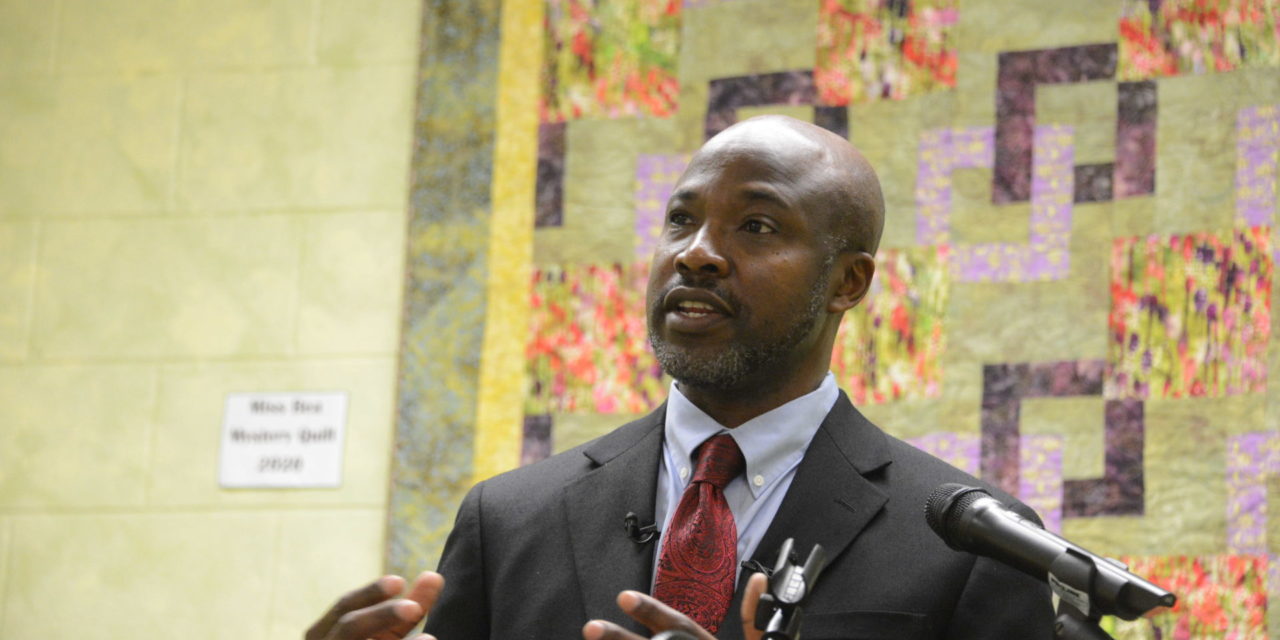On Monday, Feb. 26, North Carolina Superior Court Judge Allen Baddour signed an order for the Greensboro Police Department (GPD) to release, by Monday, March 4, the body-worn camera (BWC) videos from the GPD officers who responded to 911 calls reporting a domestic disturbance at the home of Greensboro City Manager Tai Jaiyeoba on Dec. 28, 2023.
Also on Monday, Feb. 26, Jaiyeoba, through his attorney James Quander, filed a motion to intervene in the court action that ordered that release of the BWC videos.
The request to have the BWC videos released was filed by the News & Record on Feb. 5, after the News & Record announced on Jan. 26 that it would be filing such action in North Carolina Superior Court.
The hearing before Judge Baddour was held on Feb. 19. The News & Record was represented by Mike Tadych of Stevens Martin Vaughan and Tadych. Attorneys from the Greensboro city attorney’s office opposed the release at that hearing. Amiel Rossabi, as the attorney for the Greensboro Police Officers Association, represented the six police officers whose BWC videos were the subject of the hearing and advocated for full release of the BWC videos.
On Feb. 20, Judge Baddour made the ruling that the BWC videos would be released, and on Feb. 21 he amended that ruling setting the date for the release as March 4, and the order was signed on Feb. 26.
Jaiyeoba, as a private citizen, was not represented by an attorney at the hearing on Feb. 19.
The motion to intervene sets the court hearing on that motion as Monday, March 4, the same day the court has ordered that the BWC videos be released to the News & Record. As of Wednesday, Feb. 28, there had been no motion filed to stay the release of the BWC videos and no appeal of the ruling by Judge Baddour had been filed.
The motion to intervene states, “This motion is timely and will not delay the resolution of the contested case or impair the orderly and prompt conduct of this case.”
However, it is difficult to understand how a motion to intervene in a case after the judge has ruled and signed the order to release the BWC videos would not “delay the resolution of the contested case.”


Continues to smell. What is council hiding or scared of? Citizens ,the race card is gonna be played.
Definitely attempting to HIDE something!
This episode is now reaching the point that one might speculate that actual crimes could be being covered up by city officials. Why else would these supposed public officials who ‘are concerned about openness and fairness’, be so strident against the release of the court ordered videos?
Oh, if these same taxpayer tit-suckers spent as much effort in trying to stop the mayhem that both citizens and our LEO’s have to face every damn day!!
I SOOOOOO really want to say I told you so.
Just fire this guy. Charlotte didn’t want him, he caused problems down there and was on the way out , when our fantastic city council found him and said ” yeah lets hire this guy, who isn’t even a US citizen and has not ever been a city manager”. Now we have another black eye as a city. Fire this person .
Yes, Fire him!
We should give the city council each a pair of boots and a shovel. They are gonna need something to dig their way out of this s–t hole they have created.
Games, all games. The Greensboro News and Record was forced to incur attorney fees for the release of the tape. Greensboro City has no such direct legal expenses as the City is using their own legal department, so it seems. However, in all likelihood, city lawyers are consulting with Greensboro law firm(s) at taxpayers’ expense. What is on that tape? Whatever it is, it must be compelling. Keep the tape and Greensboro City Manager Tai Jaiyeoba on the front burner. Keep that worrisome gnat working overtime.
The City NEVER should have assumed this risk. Jaiyejoba should have been labeled a “former employee” before all this TRUTH comes out. Police Officers following chain of command should not be the litigious situation here. Wake up! Domestic Violence against minors is the crime here. Smoke and Mirrors does not change the TRUTH.
One simple way the motion would not interfere with the existing order would be to hold a hearing on the motion in the morning, promptly deny it, and release the videos in the afternoon or evening. Probably the untimely intervention might be disposed of through some procedural technicality or deficiency if the Court so determines.
Games, all games. The Greensboro News and Record was forced to incur attorney fees for the release of the tape. Greensboro City has no such direct legal expenses as the City is using their own legal department, so it seems. However, in all likelihood, city lawyers are consulting with Greensboro law firm(s) at taxpayers’ expense. What is on that tape? Whatever it is, it must be compelling. Keep the tape and Greensboro City Manager Tai Jaiyeoba on the front burner.
I do hope Jerry Bledsoe is researching all this on the down low.
Third Worlders gonna Third World.